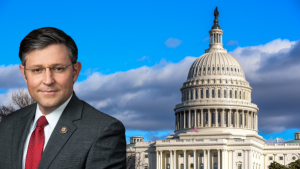Life, Liberty, Property #60: The Feds versus the states and vice versa—on border security, education, abortion, etc.
by S.T. Karnick
IN THIS ISSUE:
- The Feds versus the States and Vice Versa
- Just Drop the Mike
- Copyright Wrongs
- Cartoon
SUBSCRIBE to Life, Liberty & Property (it’s free). Read previous issues.
 The Feds Versus the States and Vice Versa
The Feds Versus the States and Vice Versa
One of the major accomplishments of the Biden administration has been a rapid increase in conflict between the federal government and the states.
While massively expanding regulation and government interference to advance leftist causes (such as the elimination of fossil fuels and the encouragement of transgender surgery for children), the Biden administration has engaged in spectacular neglect of constitutional duties in matters where the solution would undermine Democrats’ political power (such as border enforcement and election security).
This conflict is turning out to be a good thing. The Left has clarified that its positions involve the full centralization of power in the federal government, and state governments and the public are finally realizing that the feds are devoted to that effort regardless of which political party has formal control. It is also increasingly clear that the nation’s institutions of economic and cultural power are with the national government in that campaign.
The states are pushing back. On immigration, for example, in addition to helping Texas guard its southern border, states are now passing laws authorizing law enforcement officers to find and apprehend people residing illegally within their borders. In doing so, these states will be able to ensure that if the federal government fosters illegal immigration, as it has been doing under President Joe Biden to appalling effect, the lawbreaking immigrants will be confined to other states even if the federal government refuses to deport them to other countries as U.S. law requires.
The Epoch Times reports on this growing trend: “Conservative states across the country—Florida, Iowa, Louisiana, Tennessee, Georgia, and Oklahoma—are taking border security matters into their own hands, proposing or passing legislation targeting illegal immigration,” writes Darlene McCormick Sanchez in a special report for the newspaper.
In Oklahoma, HB 4156, signed into law by Gov. Kevin Stitt on Wednesday, gives “state law enforcement officers the authority to arrest people without legal authority to be in the United States,” designating the offense an “impermissible occupation,” USA Today reports.
A first offense is now “a misdemeanor punishable by a year in county jail and/or a maximum $500 fine,” and “[s]ubsequent arrests will be felonies punishable by up to two years in prison and/or a maximum $1,000 fine,” the newspaper notes. Either way, “offenders will be required to leave the state within 72 hours of their conviction or release from custody, whichever comes later,” the paper reports.
The Oklahoma bill is a direct response to the federal government’s refusal to maintain border security, a proponent said. “The failure of the federal government to address this issue … has turned every state into a border state,” bill sponsor state Rep. Charles McCall said in a statement, Sanchez reports for The Epoch Times.
Previously, Texas enacted a law that “makes it a state crime to enter Texas outside legal ports of entry,” which has been tied up in the courts, the newspaper notes.
Florida, the paper reports, “has proven as aggressive as Texas” in deterring illegal immigrants from staying in the state, through a variety of new laws.
In Iowa, a law that will go into effect on July 1 “makes it a misdemeanor for anyone who has an outstanding deportation order, has been deported, or has been denied admission to the United States to be in Iowa or attempt to enter the state,” and makes it a felony in some cases where the individual has broken additional laws, the story reports. Sanchez quotes Iowa Gov. Kim Reynolds as saying, “Those who come into our country illegally have broken the law, yet Biden refuses to deport them. This bill gives Iowa law enforcement the power to do what he is unwilling to do: enforce immigration laws already on the books.”
A new Tennessee statute requires state law enforcement officers to notify federal immigration authorities if they run across anyone in the state illegally, and the Georgia House of Representatives passed a law to “require jailers to check the immigration status of inmates,” the newspaper reports. Those laws seem weak, given that they would rely on federal immigration authorities to do their jobs, which has been the problem throughout the Biden presidency.
Other states are considering measures to increase enforcement of immigration laws, and cities and counties “are also pushing back in creative ways to stop illegal immigrants from coming into their jurisdictions,” The Epoch Times reports. Counties in upstate New York, for example, have been “using local zoning laws to stop [New York City Mayor Eric Adams] from busing illegal immigrants to live in their hotels,” Sanchez notes. Taunton, Massachusetts used its zoning laws to prevent the state from housing homeless people and immigrant lawbreakers at a local hotel.
Sanchez depicts these efforts as an increasingly fraught conflict between states and the federal government. In addition to the administration’s grossly irresponsible “catch and release” program, the president has been abusing a parole policy that “was created years ago to allow presidents to let people in on a case-by-case basis for ‘urgent humanitarian reasons or significant public benefit,’” to admit 326,000 people into the country, a blatant misuse of that provision.
Sanchez summarizes the situation as a conflict the federal government has initiated against the states: “But as hard as states are working to deter illegal migration, detractors say the Biden administration has been equally diligent in working to allow them into the country.”
A similar case of Biden administration aggression against the states through a flouting of the plain language of the law is playing out before the U.S. Supreme Court in the consolidated cases of Idaho v. United States and Moyle v. United States.
The Court heard oral arguments in late April over “Whether the Supreme Court should stay the order by the U.S. District Court for the District of Idaho enjoining the enforcement of Idaho’s Defense of Life Act, which prohibits abortions unless necessary to save the life of the mother, on the ground that the [federal] Emergency Medical Treatment and Labor Act preempts” the Idaho abortion law, as SCOTUSblog describes it.
In this case, the Biden administration is trying to negate a state’s law against abortions by deploying a federal law that was not intended to deal with that issue. Although the oral arguments dealt with a wide variety of subjects, Justice Samuel Alito ultimately zeroed in on that point, as SCOTUSblog reports:
Alito complained, with about 30 minutes left in the nearly two-hour argument, that the attorneys and the justices had “hardly” mentioned EMTALA’s reference to the “unborn child,” suggesting that it was an odd phrase to put in a statute that, on the government’s reading, is supposed to require abortions? In Alito’s view, the inclusion of the phrase indicated that the statute imposes a duty not only to the pregnant woman, but also to the unborn child. But the government, he said, was asking the justices to interpret “a statute signed by Ronald Reagan” as imposing a duty to perform an abortion even when doing so would be contrary to state law.
Alito and Justices Clarence Thomas, Neil Gorsuch, and Amy Coney Barrett questioned the use of the federal government’s spending power to override state criminal laws, asking “whether the government can supersede Idaho’s general abortion ban by imposing conditions on the recipients of federal funds,” especially when the state is not a party to the transaction, SCOTUSblog reports:
Justice Clarence Thomas and Alito raised this question, with Thomas asking [U.S. Solicitor General Elizabeth] Prelogar to identify other legislation under the Constitution’s spending clause that preempts criminal law. Thomas and Alito also questioned whether the federal government can supersede a state’s laws when the state did not enter into the contract with the federal government (and therefore did not agree to the conditions imposed by the government). [Parentheses in original.]
Justice Neil Gorsuch expressed concern about the scope of the government’s power to place conditions on federal spending. Could the federal government, Gorsuch asked, condition the receipt of funds by hospitals on their compliance with federal medical malpractice and licensing requirements?
Barrett suggested that it was “odd” that a private entity could circumvent state law though a side agreement with the federal government. Could Congress use its authority under the spending clause to regulate or prohibit other kinds of medical care, she asked, such as gender reassignment surgery, or to ban abortion across the country?
As the arguments indicate, the Biden administration is trying to impose its policy decisions on the states by creating an imaginary provision in existing federal law.
Meanwhile, in Utah, the state government enacted a law in March establishing a refusal to enforce federal government decisions with which it disagrees. Under the new law, “The Legislature may, by concurrent resolution, prohibit a government officer from enforcing or assisting in the enforcement of a federal directive within the state if the Legislature determines the federal directive violates the principles of state sovereignty,” Reason magazine reports. The new law defines “government officer” as “an individual elected to a position in state or local government.”
“Basically,” Reason contributing editor J. D. Tuccille writes, “the act says if Utah doesn’t like a federal law, the feds will have to enforce it themselves.” Thus “Utahns joined the ranks of Americans telling the federal government to go pound sand,” Tuccille writes.
The law is based on a concept called commandeering, in which the federal government forces state governments to enforce national laws and regulations, Tuccille notes:
Justice Sandra Day O’Connor wrote for the majority in New York v. United States (1992): “The Federal Government may not compel the States to enact or administer a federal regulatory program.”
That’s come to be called “anti-commandeering doctrine.” It means that, while states and localities can’t actively impede federal enforcement of laws and rules created in D.C., they don’t have to expend a single dime or drop of sweat to assist the feds.
This law is “a low-drama way of setting boundaries based on the Constitution and existing court precedents,” Tuccille writes. “Facing off with the feds may get publicity but ignoring them has a higher chance of success” than, for example, the Texas border-security actions, in surviving court challenges, Tuccille says.
Opinion polls show that Utah’s approach accords with current public opinion across the country, Tuccille notes:
“Just 16% of Americans say they trust the government in Washington to do the right thing just about always or most of the time,” according to Pew Research.
“Americans have the most faith in local government (67%) and the least faith in the legislative branch of the federal government, or Congress (32%),” add Gallup pollsters. State governments fall between the two.
Judging by the opinion polls and Utah’s new law, “Americans seem ready to move decision-making closer to home, as locally as possible,” Tuccille concludes.
On Thursday, Gov. Sarah Huckabee of Arkansas signed an executive order directing state agencies not to enforce the Biden administration’s new Title IX interpretation changing the definition of “sex” to “gender.” Fox News reports:
The executive order states: “Educational institutions of Arkansas will continue to enforce state law guaranteeing the right of students to maintain their privacy. Students must not be forced to shower or undress with members of the opposite sex.
“Female students must not be denied equal athletic opportunities or forced to risk their safety by having biological males placed into female-designated sports leagues.”
Sanders called the Biden Title IX regulations an “attack on common sense” and said she was “appalled” by the rule.
A couple of days earlier, six states sued the U.S. Department of Education to block implementation of the rules. Tennessee Attorney General Jonathan Skrmetti, one of the AGs leading the lawsuit, said, “The U.S. Department of Education has no authority to let boys into girls’ locker rooms,” in a press statement.
The federal government, especially under Biden, routinely ignores its responsibilities whenever doing so serves the Left’s interests; it pushes its agenda through grotesque distortions of federal law and regulatory authority; and it forcefully resists efforts on any level of government to put things right, as the current controversies demonstrate. The Biden administration is doing everything it can to establish full authoritarian rule on the national level, with the states diminished into nothing more than its slave drivers.
The people clearly side with their state and local governments in this conflict. The largest remaining impediment to the success of the rising resistance is the refusal of many or most congressional Republicans and of any Democrats at all to provide even a nominal amount of aid or comfort to this effort at the national level.
Sources: The Epoch Times; SCOTUSblog; Reason; Fox News; Fox News
 Just Drop the Mike
Just Drop the Mike
I admit it: I was fooled. I was a dreamer.
Rep. Mike Johnson (R [alas]-LA) has been a disaster as House Speaker, at least as bad, from a policy perspective, as GOP predecessors Kevin McCarthy, Paul Ryan, and John Boehner.
When the Republican caucus unanimously voted for Johnson as House Speaker in October of last year, I was as optimistic as the GOP representatives, in my comments in Life, Liberty, Property #37:
Johnson is a solid conservative and a constitutional scholar with lifetime ratings of 92 percent from the American Conservative Union and 90 percent from Heritage Action. In 2020, Johnson argued states’ unconstitutional changes in voting procedures in a supposed response to COVID-19 invalidated their elector slates. He has consistently opposed federal government support of abortion and sex and gender radicalism.
Johnson voted against the bipartisan short-term spending bill that passed with near-unanimous Democrat support on September 30 (just one Dem voted no) in an allegedly Republican-controlled chamber. He voted against sending $40 billion to Ukraine for warfighting last year and another $300 million this year. Johnson has expressed agreement with the GOP budget hardliners’ call for individual appropriations bills, while proposing another short-term spending measure to fill in the gap until those bills can be passed.
I was particularly impressed by the opposition to bipartisanship indicated in Johnson’s voting record:
… Johnson does not subscribe to the bipartisanship myth that has served as the basis for big-government uniparty rule for decades.
“In Biden’s first two years, Johnson voted against a slew of bipartisan bills—including to establish a Jan. 6 independent commission, the infrastructure law, reauthorization of the Violence Against Women Act, a modest new gun law and the CHIPS and Science Act,” NBC News reports. In addition, “He voted against bipartisan legislation to codify same-sex marriage, which Biden signed into law in 2022,” and “has a spotless history of voting against legal abortion,” NBC News observes.
“Johnson isn’t known for bipartisanship,” The Wall Street Journal reports. “He was ranked 429th out of 435 lawmakers in the 2021 bipartisan index kept by the Lugar Center and the McCourt School of Public Policy at Georgetown University, situated among members of the staunchly conservative House Freedom Caucus.”
Since then, Johnson has consistently coordinated with Democrats to spend vast additional sums of money borrowed from imaginary future taxpayers, rammed through much-higher spending on foreign wars, ignored the crisis at the southern border, and generally served simultaneously as President Biden’s lap dog and stalking horse.
Super-RINO Sen. Mitt Romney of Utah got it right when Johnson was nominated, saying Romney “knew ‘very little about [Johnson]’ but that it would ‘be interesting to see how the House runs if they choose a speaker that has no experience in leadership or as a committee chair. … Inexperience seems to be a qualification,’” as NBC News reported at the time.
I considered “Johnson’s shorter tenure a plus,” I wrote. “Nine to 13 fewer years of compromising with—and conspiring with—Democrats to defraud and disempower the American people is a good deal less rottenness than we usually get with newly minted House Speakers.”
Romney, by contrast, knew precisely how persuasive the permanent federal-government apparatus and its deep-state enforcers can be. As CNN reported after the House voted in April to fund multiple foreign wars, ignore the budget, and leave the southern border open,
Johnson received a key intelligence briefing from CIA Director Bill Burns, who painted a picture of the dire situation on the battlefield in Ukraine and the global consequences of inaction, according to multiple sources with knowledge of the situation. The briefing left a lasting impression, and Johnson became increasingly convinced the fate of Western democracy was on his shoulders, sources close to him said.
Long before talking with the CIA, Johnson sought out the opinions of the House Democrats, CNN notes:
The day after Iran attacked Israel, House Speaker Mike Johnson was on the phone with a man who suddenly held the keys to his legislative agenda and potentially his own future: House Democratic leader Hakeem Jeffries.
In a phone call that has not been previously reported, Johnson said he was ready to act on foreign aid, even though that would enrage Republicans who did not support additional assistance to Ukraine and could potentially cost him his job, a source familiar with the conversation told CNN.
After getting an earful of complaints from fellow Republicans, Johnson consulted God, CNN reports:
Johnson sat in his office as members streamed in to voice their complaints and level their demands. By nighttime, he was wrestling how to proceed. Feeling the weight of his future and knowing history was watching him, Johnson, a devout Christian, turned to prayer.
“He was torn between trying to save his job and do the right thing,” House Foreign Affairs Chairman Michael McCaul, a top Ukraine advocate who was with Johnson the night before the legislation was released, told CNN. “He prayed over it.”
Johnson ultimately emerged Wednesday firm in his convictions that he was on the right path to make the most consequential decision of his political career by moving ahead with billions of dollars in foreign aid. The decision culminated in a tense scene on the House floor as Republican members traded insults and the speaker navigated his warring factions.
As has been the norm since Johnson took the Speaker’s gavel, the Democrats got what they wanted with the support of weak-kneed Republicans.
In practical, policy terms, Johnson has been no better than his much- and justly maligned predecessors. In fact, Johnson may be even worse than they, given the further advancement of the government debt spiral and deterioration of the international situation since they left office, which should have made it clear to him that continuing down that path can lead only to immense destruction.
Perhaps the GOP hardliners could work for just one small concession from the Speaker and his Democrat allies—the installation of a sign over the doors of the House chamber, reading, as follows:

That sign should be placed over all the nation’s voting booths, as well.
Sources: NBC News; CNN; The Divine Comedy
 Copyright Wrongs
Copyright Wrongs
Power over the communications media is a crucial element of control of the public, and the federal government fosters this power for its own ends. So writes scholar Josiah Lippincott at his Regime Critic Substack:
Through the ownership of the production and duplication of music, films, and books, a handful of wealthy corporations have effectively gained control over the tastes and habits of the American people.
These copyright holders, these engines of American culture, are overwhelmingly liberal. Their power over our common artistic life grants these titans an unholy and illegitimate level of control over our national life.
I have written extensively in this newsletter and elsewhere on how the current excessive length of copyright protection enhances the centralization of power within the culture and in the federal government. Lippincott notes that this copyright regime empowers gigantic, multinational corporations with unprecedented levels of cultural control: “Disney has a market cap of $203 billion—virtually all of which is a result of Disney’s copyrights. Disney is valuable as a company because it has a monopoly on the reproduction of popular stories and intellectual properties.”
This government-granted privilege gives those companies enormous influence over the public, Lippincott observes:
That translates to political power. If Disney wants to produce Star Wars movies with purple-haired girlbosses, homosexual characters, and ham-handed racial diversity, those cultural products are going to be seen by millions because they are part of the Star Wars universe, a major part of our cultural life. Disney has the money and the monopoly, and therefore the platform to make sure that political goals important to its leadership, such as the promotion of homosexuality and feminism, are seen by millions.
Without copyright protections, Star Wars would go into the public domain. The original films could be copied and sold by anyone and a new author or company could use the Star Wars trademarks in order to create entirely new works of art. Disney’s gay girlboss version of Star Wars would simply be one of dozens, or even hundreds, of versions that could be produced at will.
There is neither need nor excuse for such lengthy copyright privilege, and this power granted to mega-corporations gives them entirely unjustified control over cultural works produced by people who died many, many years ago. Lippincott writes,
Under today’s copyright law, works remain under copyright, in most cases, for 70 years after the artist’s death. This state of affairs is ridiculous. For instance, JRR Tolkien’s Lord of the Rings series will not go into the public domain until the early 2040s, since Tolkien died in 1973. The more recent movies and TV shows, however, will remain under legal protection until well after 2100 under current law. That isn’t all. Virtually all of the titles and characters in Tolkien’s world are also trademarked. Trademarks can be renewed at ten-year intervals forever under federal law as long as certain conditions are met.
Though Tolkien is long dead, massive corporations, like Amazon and HarperCollins, continue to profit off of his creative work and the value it created. Their monopolistic control of that world grants them the ability to milk his talent even decades after his death.
Today’s copyright regime does the exact opposite of what copyright was originally intended to accomplish. At the nation’s founding, copyright lasted for 14 years, renewable—by the author only—for one additional term. Copyright of that length allows a living author to profit from his or her products, thus promoting “the Progress of Science and useful Arts, by securing for limited Times to Authors and Inventors the exclusive Right to their respective Writings and Discoveries,” as stated in the constitutional clause establishing it.
Copyright of the present length extends that privilege to the author’s descendants or other legatees and to corporations designed to take advantage of this scheme. Lippincott writes,
A 14-year limit on copyright is still more than enough time for an artist to profit off of their work. Hit films, books, and TV shows make plenty of money in their first runs. Preventing long-term monetization over decades doesn’t stop artists from making lots of money with a new piece of art but it does put an end to grifting by production companies and estates who capitalize off of popular works of art for decades.
Thomas Jefferson had proposed for the Bill of Rights a constitutional amendment explicitly limiting the term of copyright to a specific number of years. The nation’s founders were wise to establish copyright, but as with so many aspects of our national design, their project has been perverted by the government’s susceptibility to manipulation by what President Theodore Roosevelt referred to as “malefactors of great wealth.” The consequences of this gross perversion of a good principle have been enormous, and the solution is to be found only in a restoration of copyright to its original purpose, Lippincott notes:
This return to copyright as originally understood—as a temporary monopoly to incentivize the creation of new culturally and scientifically valuable work by allowing artists a way to monetize their labor—would strike a major blow at the leftwing corporations that now own our culture. A more limited copyright would also help new artists. By restricting the long-term monetization of cultural properties, publishers would need to fund and publish more new artists in order to turn a profit.
Restricting copyright would cripple corporate gatekeepers to the benefit of small and up and coming artists and production companies. It would also make older books and films much cheaper. Due to digitization, the actual cost of transmitting public domain books and movies would drop to nearly zero. Netflix, Hulu, Spotify, Paramount+, and Disney+ would not be able to charge high monthly fees to show older content that would now be available basically for free.
I oppose the current copyright system because it is perverted and unjust, and I would do so regardless of any assertions about consequences favorable or otherwise. Lippincott, however, is right to emphasize the scope of the damage this legal scheme does:
The ability to punish unauthorized duplication of artistic works gives the holders of those rights an unparalleled power to shape our culture. Take that power away and America would be a much better country. …
Copyright reform is one of the most important steps we can take to a better, more healthy, American cultural and political life.
“Take that power away.” Yes, by all means, please do so.
Sources: Regime Critic; Chronicles
Cartoon

via Comically Incorrect
For more great content from Budget & Tax News. For more Rights, Justice, and Culture News.
For more from The Heartland Institute.











